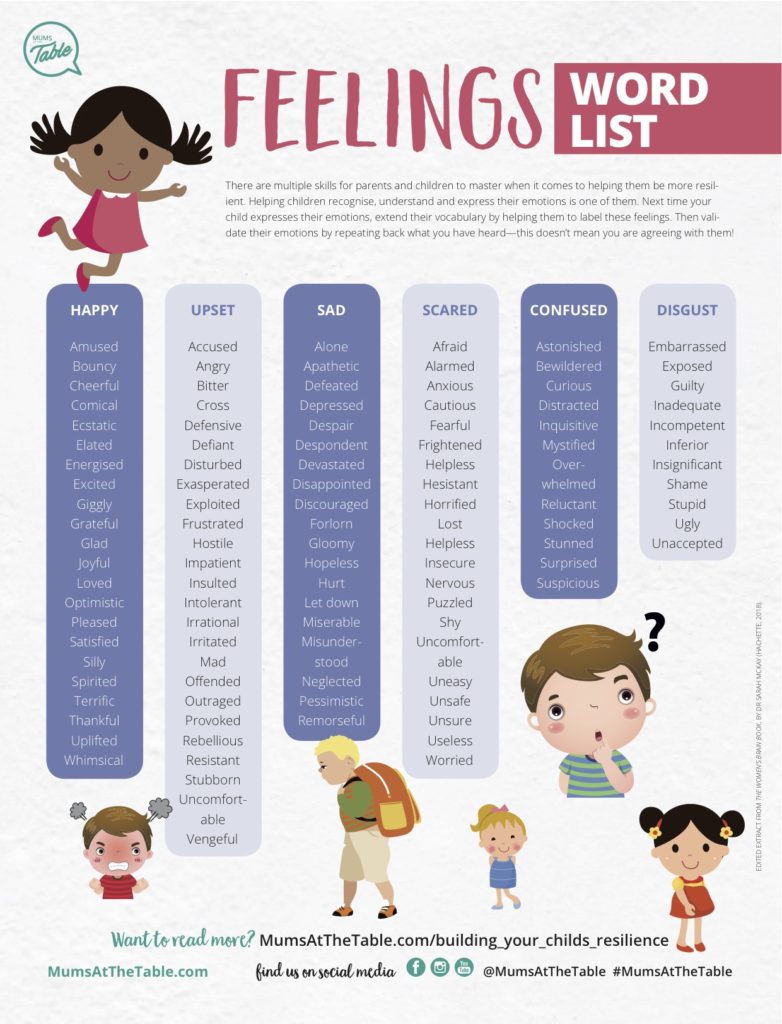Psychologists are warning parents of the need to react appropriately when a child displays negative emotions. It’s the difference to raising an emotionally intelligent child.
Children’s feelings are wide and varied—and valid. Most parents have had front row seats to their children’s displays of emotions. And while it’s never fun to watch our kids experience sadness or even anger, psychologists are warning that how parents react to a child’s emotional expression will have an impact on their emotional intelligence.
Read on for the recommended things to say to help grow our children’s emotional intelligence as well as a free word list to help them identify what they’re feeling.
Related: Positive parenting approaches for when a child misbehaves
What is emotional intelligence?
Emotional intelligence (EQ or EI), as the words suggest, is all about a child’s emotions and their emotional world. It’s about recognising that we can all have emotional moments and intense feelings, and learning to express and deal with them in an appropriate way.
Raising emotionally intelligent kids can help them to deal better in negative situations, both for the benefit of their own mental health and how they interact with others. It creates opportunities for emotionally healthy adults with healthier social relationships
As Daniel Goleman, the psychologist widely credited for coming up with the concept, says, “Children who develop emotional intelligence have the ability to self-regulate, are able to negotiate conflict and solve problems in relationships further on into life.”
Why is emotional intelligence in kids important?
Raising an emotionally intelligent child means ensuring they are emotionally rounded. It helps them to cope in difficult situations or when they face an upsetting issue, ensuring they don’t simply give up. Knowing how to deal with positive and negative feelings can also lead to higher levels of empathy and compassion.
“All parents want their children to be happy, but it shouldn’t be our parenting goal,” says psychologist Collett Smart. “When children only think about being happy, it fails to acknowledge all the emotions we experience as humans. Even worse, we fail to build resilience and teach them to regulate their feelings.”
While we often focus on developing our children’s intellectual skills, it’s also crucial to develop their emotional skills. Emotional intelligence is such an important life skill many universities are now offering emotion coaching courses to help students cope better at school and workplaces.
How to develop emotional intelligence in our children
Building emotional awareness is about learning how to properly display those strong feelings. Even small children can learn how to react appropriately.
In the video below, Collett shares tips for nurturing emotional intelligence in kids.
As Collett points out, a child’s life isn’t just about being happy. There are occasions when sadness and grief are the right responses. Feeling anger in the face of bullying and injustice is also an acceptable emotion. Parents however, need to teach children not to lash out, hurt or hit others when upset.
“It’s about teaching children to react in emotionally healthy ways,” says Collett.
1. Let them verbalise and talk about what’s going on
This shouldn’t be done when they’re deeply experiencing the feelings, but to help them process it after the incident.
2. Questions to ask your kids
Emotional coaching is a practise. The kids aren’t going to get it right the first time. Asking the following questions, however, will encourage them to think, reflect and hopefully react better in future:
- What was going on with you before you exploded? (The aim is to get them to think about the process leading up to the incident.)
- What happened?
- What could you do next time that’s more helpful or kind?
- What can you do differently?
3. Praise and encourage
When they do something well, when they react appropriately, ask them, “How can you do more of that next time?”
Emotional intelligence can be learned
Raising an emotionally intelligent child is about getting them to think of their emotions and the resulting behaviour, not suppressing them. It is important to role model the type of behaviour we want them to display and to listen to our kids’ emotions. This will help them learn to deal with our emotions in healthy ways.
Free feelings word list

How helpful was this article?
Click on a star to rate it!
5 / 5. 1
Be the first to rate this post!
Melody Tan
Related posts
Subscribe
Receive personalised articles from experts and wellness inspiration weekly!

